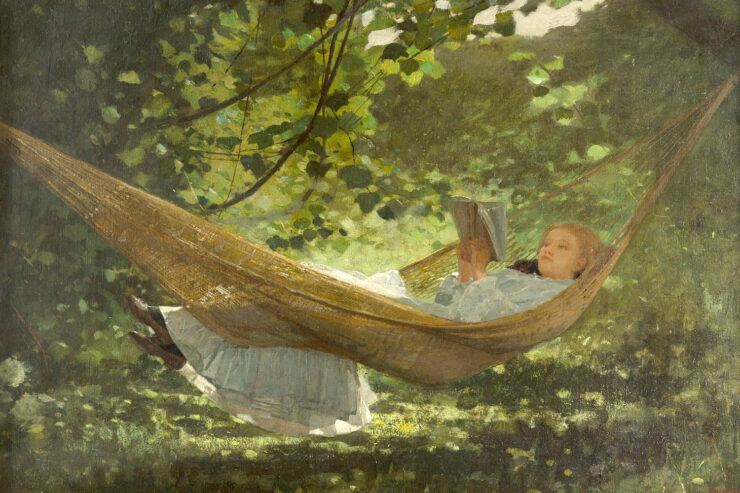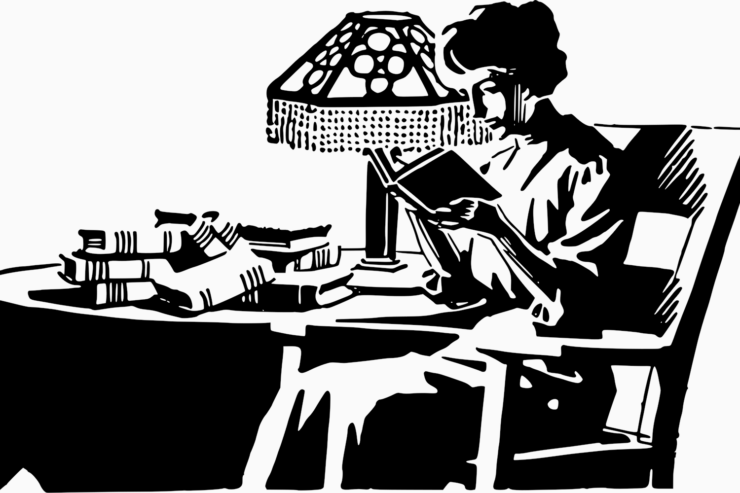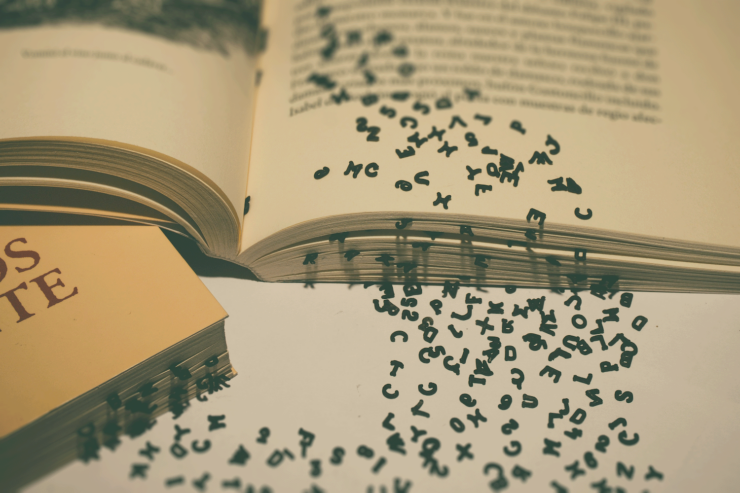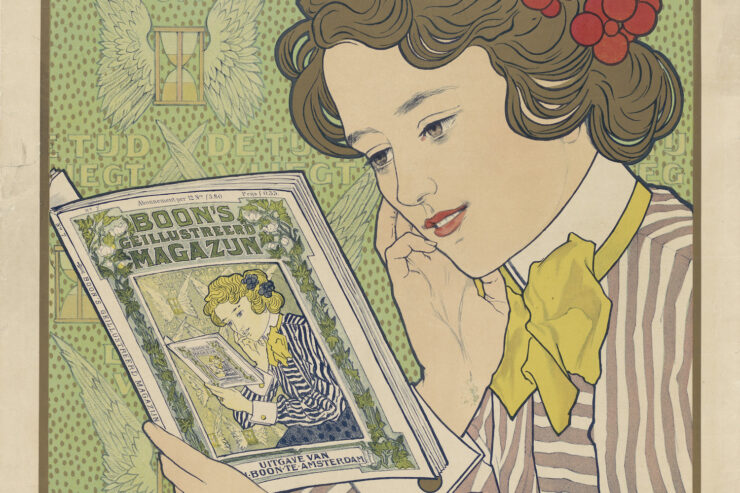According to a June piece in Esquire, short books “are finally getting their due.” I suspect this news may feel a bit belated to many Tor.com readers; you have, I’m sure, been aware of Tordotcom Publishing’s novellas for years now. (SFF being SFF, the Esquire piece mentions a whole lot of other programs and lines of short books, but not this one.) In July, The Atlantic offered some short summer reading suggestions, at least one of which was immediately added to my “things I should definitely read” list.
The thing is, I kind of thought I hated short books.
“Hated” is maybe a strong word. Was not a fan of. Did not generally care for. Never gravitated towards. This is probably not an uncommon feeling among SFF readers who grew up in a certain era without access to genre magazines or other sources of short fiction. If I was going to get a book out of the library or spend my holiday gift certificates on it, I wanted it to be as thick as possible. As much book as my dollars could buy; as many pages as I could get from the library at once. I was pretty sure I respected novellas, but I did not particularly want to read them.
And when they’re not done well, there’s a reason for that: Sometimes a novella feels like a novel without an ending, or a short story that went on too long. Knowing how long to write a story—or a column, or an essay, or a blog post—is a real skill, and one that any writer might struggle with. It doesn’t always work out right. You run long; you leave an idea out.
But when you hit the balance, something magical occurs.
It started, for me, with short nonfiction. Marina Benjamin’s Insomnia. Maggie Nelson’s Bluets. Thin books, rich with ideas, clean sentences, things that resonated. There’s no room for clutter, in a short book, and while my brain frequently adores narrative clutter—stuff everything in there! Give me the history of some strange corner of the world, Neal Stephenson-style!—it has, of late, wanted something else. Something you might call “quieter,” even though the stories are not necessarily quiet. Something from which everything unnecessary has been gently removed.
I read two Chloe Hopper novels in a day: A Child’s Book of True Crime and The Engagement, neither of which are SFF but both of which are unnerving and wily, taut tales you cannot disengage from—and trust me, I tried, but once I had picked up those narrative threads I needed to follow them all the way to their uncomfortable ends. (I truly don’t understand how The Engagement, a very disquieting Australian Gothic of sorts, has not been made into a movie.)
I read Camilla Grudova’s crumbling-movie-theater-set Children of Paradise; I read Sasha LaPointe’s elegant memoir Red Paint. I read Play It As It Lays, and then I needed to lie down. (Didion will do that to you.) I read Nghi Vo’s upcoming Mammoths at the Gates and spent the whole book wanting to cry for reasons I could never quite put my finger on. I started looking for more short books in my tower of unread books: What here is under 200 pages? What can I eat up like a perfect snack? What does my feral-child brain wish to graze on next?
There are theories—some of them included in that Esquire piece, and some of them quite depressing—about why we, culturally, might like short books right now. Short attention spans. Rising hardcover prices. (I don’t feel like the short books are generally that much cheaper, but I also haven’t done a survey.) The simple satisfaction of finishing a book and moving on to the next one. Spending your time with many minds, many kinds of brilliance, instead of submerging in one for a long, slow time.
It’s those last two that make short books feel so summery to me—this summer, this moment, this year of fires and floods and storms. Shorter books are not necessarily light and swift, thematically speaking, but they can feel that way all the same, especially when you have become accustomed to long, tangled tales, epics and trilogies and narrative arcs that play out in multiple points of view, multiple volumes, multiple galaxies.
I have had it with multiverses for the time being. I have had it with more versions of superheroes, more versions of worlds, stories that are so busy offering more, more, more that they forget to make us care about what’s right in front of us. There is a point at which exploring every corner of a fictional universe stops feeling like exploring and starts feeling like exploiting, and more than one once-beloved franchise is there.
The short books aren’t just an answer to long books. The short books are a counterpoint to spinoffs and sequels and having to watch TV series to understand what’s happening in a movie and needing a quick wiki check to remember the name of Tertiary Character #47, whose death was meant to be very moving in the seventeenth episode of the third spinoff, except that we all forgot his name already.
We are in a moment that is reminding us, in so many ways, that many of the stories we love are or have become commerce. Companies don’t even want to pay the people who write those stories; how are we to maintain our illusions, our idealistic notions that these stories are on display because they are meaningful and important, when we’re constantly being reminded that their creation means nothing to the people who hold the purse strings?
The stories are—can be—meaningful, important, the things dreamt up by individual writers and storytellers. (Let us not say “creators.” Let us not say “content.”) I want to believe, like Fox Mulder, but I want to believe that stories are told because people need to tell them. Not because some guy in a fancy suit thinks he’s going to make enough bank to buy a second yacht.
This moment in time requires a nigh supernatural ability to suspend one’s disbelief.
But a short book is not a franchise. A short book is probably not making anyone wealthy. (There are, as ever, exceptions. Probably.) A short book is not likely to balloon into a multiverse (unless it’s a comic book, perhaps, and even then it might take decades). A novella is ripe for adaptation, it’s true. If only the people in charge of adaptations realized that novellas are all beautiful movies waiting to be made, without even a bunch of stuff you have to take out in order to fit your runtime or make the test audiences happy.
But then they might stop being perfect little worlds, and start mutating into nightmares.
Should you find yourself tired, scattered, sweaty, worn-out, feeling like the end of summer coming for your mental well-being; if you just want to be somewhere else for a while, not overcommitted, not making a cheat sheet of character names: I recommend a novella. A 200-page novel. A standalone, brief and powerful, or a novella in a series that does not demand you remember every detail from every previous volume. Maybe Ursula K. Le Guin’s “Paradises Lost” (Lee Pace agrees with me) or Olga Ravn’s The Employees or any one of Nghi Vo’s Singing Hills stories or a Rachel Cusk book or Alan Watts’ Become What You Are or any number of award-winning novellas and novelettes you might find on this very website.
The epics will still be there, sprawling, immersive, rich. Excellent for winter. But for summer, I vote for the concise, the elegantly brief, the contained.















So right about Nghi Vo—I can’t wait to read Mammoths at the Gates. I also recommend Sarah Tolmie and Sarah Moss!
As previously mentioned, I read a lot of older SFF. Decades ago, SFF was seen, arguably unjustly, as the domain of children and emotionally stunted adults. Neither being known for attention spans, publishers were loath to publish long books (I remember Gordon Dickson complaining about this). Sometimes they would assist authors to produce short novel by brutally cutting long novels [1]. On the one hand, this inspired some authors to abandon narrative luxuries like characterization and elegant prose and inspired others to speed the plot with narrative-facilitating coincidences that ERB would have been embarrassed to rely on. On the other hand, the better examples could be marvels of lean efficiency, delivering in 120 pages what modern authors struggle to deliver in multiple volumes.
(That said, I member reading The Mote in God’s Eye and marvelling that even after [giant spoiler], there were more pages left than most of my other novels had in total)
1 John Brunner’s Jagged Orbit, for example, is 100 chapters in English and 33 in its first German edition. This was not to the novel’s benefit. I don’t recall if the publisher added soup ads to this particular Brunner.
I would add the Murderbot books by Martha Wells as well as Piranesi by Susanna Clarke. It’s not quite a novella, but definitely a short book.
The idea of most book for your buck is amusing considering Tor.com has the diabolical practice of selling novellas by excellent authors at high prices. I’d protest by not buying them but Murderbot.
There is something to be said for a story that can be finished over an (accidentally) long lunch. Though I do like books long enough to be indulgent. The solution, of course, is more of both.
I’m in an author seeking phase now. I have moved to a lot of shorter fiction, it gives me an easy to get through taster of a author that an epic might be too much to just try out.
I find my obsession with short books started about 6 years ago when I started counting how many books I read on GoodReads. I wish we could/would count pages read instead so that large tomes would be worth their value. When you only count books it doesn’t lend to wanting to read larger ones. Who wants to read Priory of the Orange Tree when reading a Murderbot novella is ‘worth’ the same count in the challenge?
So I’ve tried to let go of obsessing about my book count and instead reading what I’m most interested in regardless of book size. This recently led me to Bone Shard series which has one of the most unique magic systems I’ve read in years!
Don’t get me wrong, I always love a good creepy short story with a cliffhanger ending that leaves you wondering. I just wish the competitive part of myself was less obsessed with counting books and more obsessed with counting pages.
(Even better would be to not obsess about either but let’s be realistic most of us love a good reading competition.)
@6, I just spent ten minutes in my Goodreads stats toggling back and forth between books read and pages read; absolutely fascinating how it illustrates which years I read a lot of short books! Now I kind of wish I could set my annual challenge at 30,000 pages or what not; that seems to be more consistent than the number of titles from year to year.
I’ve never been a big fan of short stories–over too soon for me–but these days I don’t have the attention span for a really big tome, let alone one story spread across a ten-book series. So novellas are perfect.
My interest in Lee Pace just went up two points. (Though not my interest in Foundation. Sorry.)
I for one have gotten at least $50 worth of enjoyment out of the Murderbot novellas alone.
I am another person who likes the shorter novels of yesteryear. No fussing about with lots of exposition, just getting right to the plot and action.
I commuted a lot by train during professional training, each way taking about half an hour. The bigger station had a bookshop with lots of SFF, mostly shorter ones, by Heinlein, Brunner, P. J. Farmer, Moorcock, Leiber, Zelazny and lots of others. Shorter fitted my reading during commuting quite well, as longer books would be hacked into too many bits, if you get my meaning. It also allowed me to explore more authors. Zelazny for instance became one of my favourites. Lord of Light and Jack of the Shadows are gems, I think.
Therefore length was something that only came with SFF books I’d read later on.
And on what you wrote on franchises, I started The Wheel of Time and loved the first volume. Then, seeing how many there were already, totally got me disinterested as I couldn’t believe it kept that quality up without going on for the sake of just going on.
I just got through reading BRAIN WAVE by Poul Anderson and found myself wondering if the children of these Bright Young Things would revert to normal once out of the Slow Zone. I also suspect that this book might have been the inspiration for Vernor Vinge’s FIRE UPON THE DEEP universe, with the Slow Zone all the way to the Transcendence.
It’s a relief that more short novels and novellas have been getting published the last few years. Some stories don’t need a lot of page count to be told, and it’s rewarding when they’re told economically and you get to enjoy that as a reader. The opposite of that is something like a recent trilogy ending volume I suffered through, where around the first half of the 400+ pages had maybe 3-4 pages of noteworthy events and developments (and I’m including the obligatory but meaningless YA sex scene in those 3-4 pages).
A novel should be just as long as the story demands, not less but also not appreciably more. And some authors are able to write novels that way. For instance, Susanna Clarke could author a weighty tome like Jonathan Strange & Mr. Norrell and then give us a (by today’s standards) relatively svelte Piranesi, and both fit the length of the story that the author had to tell. And were excellent. For even shorter works like novellas, everyone mentions the Murderbot series, where most of the books teeter on the border of novella and short novel (and are also excellent), somewhere around where older fiction works like Siddhartha and Heart of Darkness live. Many “classics” are somewhere in that territory, including Lord of the Flies, Fahrenheit 451, and The Hound of the Baskervilles. So it’s good to see we’re getting more works at this length. Not every novel needs 500, 700, or even more pages to tell its essential tale.
Or a book of poetry !
The God Engines, a grim science fantasy with religious elements by the usually cheerful John Scalzi, is an excellent short book.
Decades ago, there were the Ace Doubles with two short books per paperback, which must be flipped over to get to the book on the other side of the paperback. (I can remember at the bookstore having to twist around to read the upside-down titles on the bottom of those paperback spines!) And a few years ago, didn’t a publisher briefly revive that idea of a two-book paperback, although maybe without the need to turn it on its head?
I’ve always loved novellas, so of course I was a very early customer of both PS Publishing & NewCon.
@6 and @7 the StoryGraph app/website will let you set your tasks by books read or by number of pages and show you pretty graphs of your reading by genre, length, medium, etc (and it’s not owned by Amazon as a bonus). I fall into the same trap with reading challenges, especially towards the end of the year when it becomes clear my ambitious goals are not going to be met
Two of my all-time favorite novels are so short they could each be read in an afternoon: Illyria and Wylding Hall, both by Elizabeth Hand. Only Wylding Hall would be considered speculative fiction but both books pack amazingly complex characters and settings in small packages. I suspect it’s much harder to do this than it would have been if she’d spread the world building out over 400+ pages.
I was thinking that I “made the reverse path”, then I realized it’s more complicated than that, and now my STEM soul wants to draw a graph. When I was a kid I read short books because children’s books are short. Then I started reading so fast that I started avoiding short books for a mostly logistical point of view: checking out one huge book that lasted a week was better than checking out three short books that combined would last two days. In my college years I barely read books, only selected chapters from textbooks and lots of manga. Then I wanted to go back to reading, and I had to start with short, light, “commercial” reads. Now I finally feel like I have recovered the brain cells and attention span to read longer books, genres that I don’t always feel comfortable with, and classics. But for audiobooks I still prefer the shorter ones.